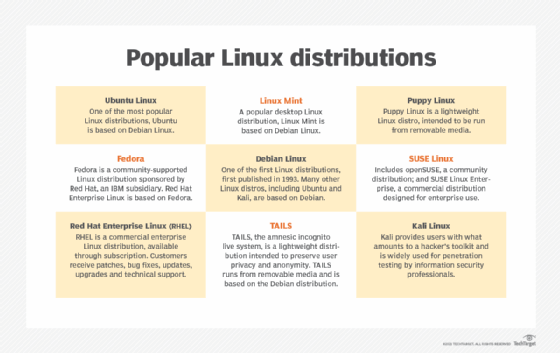What is Linux distros (Linux distribution)?
A Linux distribution -- often shortened to Linux distro -- is a complete operating system based on Linux. It is packaged with other components and software to make it fully usable out of the box. Because Linux is very modular, different distros will focus on different target use cases.
Linux distributions, which are based on the Linux kernel, are often easier for users to deploy than the open source version of Linux. The Linux kernel is released as source code, which needs to be compiled before it is used. The kernel also does not contain many of the elements that a user might need, such as installation programs, a graphical user interface, management tools and additional software, such as a KVM hypervisor. A distro takes all these elements and brings them together into a single release.
Linux distribution types
Hundreds of Linux distributions are available today, and each targets specific users or systems, such as desktops, servers, mobile devices or embedded internet-of-things (IoT) devices. A major appeal of Linux is its adaptability. The same Linux kernel can run everything from a small single central processing unit (CPU) temperature sensor, to a modern desktop environment, to a ten-thousand-CPU supercomputer. The differing needs of these systems can be met by using different Linux distros.
Some distributions -- such as Fedora and Red Hat Enterprise Linux from Red Hat, openSUSE from SUSE, Ubuntu from Canonical, and Oracle Linux from Oracle -- are commercial, while others -- such as Debian and Slackware -- are community-developed. Some commercial distributions, for example, those from Red Hat and Oracle, charge users for services, such as support or custom development, although open-source licensing prohibits charging for the open-source software itself.

Community vs. commercial Linux distributions
One of the most important decisions when choosing a Linux distribution is whether to use a community (free) or commercial (paid) version. Because Linux has open-source software at its core, every commercial company that has a paid distro must also have a free version, often called community version. It is tempting to think that the free version can be used as a money-saving tactic, but for many organizations, the trade-offs are not worth it.
The primary differentiator between community and commercial Linux distributions is the level of service provided by the vendor. The free community distro is often released as is with no additional provided support or guarantees. The only way to get help is by posting to a forum and asking other users for assistance. The paid versions, however, often come with service contracts and response time guarantees. The support staff can work with the developers directly and may be able to get custom fixes implemented.
The value of service contracts becomes clear when you consider how important Linux is to many organizations. For example, if the 100-node web server for a shopping platform were to have a problem that causes it to lose 1% of sales -- this would be a critical issue that could be difficult to diagnose. Direct communication with the distro maintainer could help resolve it much faster.
Long-term support distros
Linux is constantly being updated. While this can be good from a user point of view, for enterprise deployments, stability is more important. Some Linux distros are called long-term support (LTS) to denote that they will stay stable for many years.
LTS distros will generally not add new features or improvements. They will update for bug fixes and security updates. This is beneficial as it makes them more reliable for deployment as servers. Users can be reasonably sure that systems which run on LTS will operate the same for as long as it is supported.
LTS distros also have very clearly defined lifecycles of many years. This allows for long-term planning and allows the same system to be used for a prolonged time without needing to reengineer it when a new version of the operating system comes out.
Linux distro packages
Generally, Linux distributions consist of what are called software packages. These packages contain specific files, applications or services. For example, a package could be a collection of fonts, web browsers or development environments. A single Linux distribution could contain thousands of software packages. Many of these packages are not preinstalled.
A Linux distribution also includes a package management system, or packet manager, which is used to install, uninstall and manage software packages. These systems also allow for package searches, automatic software upgrades and verification that all package dependencies are fulfilled. Examples of package managers include Red Hat Package Manager, Yellowdog Updater Modified and Advanced Packaging Tool.
These package repositories are often not the same between distros. The software available out-of-the-box for Ubuntu might not be the same as for Red Hat, for example.
Open source development
Linux is founded upon open source software development. Linux distributions emerged under the copyleft stipulations of the Free Software Foundation, which originated the GNU General Public License (GPL). Copyleft dictates that any software taken for free and altered must be consequently distributed for free.
So if a developer uses Linux, or GNU components, to create a new version of Linux, the new version must be free. Commercial Linux vendors such as Red Hat typically generate revenue from services and tools rather than the Linux package itself.
Linux distro families
Because most Linux distributions are released as open source, it is possible to take one distro as the core and release it as a new one with modifications. This means that many distros are derivatives of other ones, which are called forks. This creates families or groups of distros that share common components but might be targeting different audiences. The term upstream or downstream can be used to denote if a particular distro receives or contributes code to another distro.
- Debian Linux. This is one of the oldest and most open Linux distributions. It serves as the base for many of the most popular distros in use today. Ubuntu Linux by Canonical is one of the most recognizable with versions for community, licensed, desktops, servers and long-term support. Other popular Debian-based desktop distros include Linux Mint, Pop-OS, Raspberry Pi OS and Kali Linux.
- Red Hat. Red Hat is a company focused on making enterprise grade Linux. Fedora is its community distribution and Red Hat Enterprise Linux (RHEL), its paid support distro. Some downstream RHEL distros include Oracle Linux, Rocky Linux and AlmaLinux.
- Arch Linux. This is a popular upstream distro that focuses on minimalism with additional packages being available on demand.
- SUSE. This is another major enterprise Linux vendor. It has commercial and community versions of SUSE Linux.
Google's Android operating system is based on Linux and can be considered a very specialized distro.
One common misconception is that Apple's macOS is based on Linux. It is not a Linux distro, instead, macOS is based on UNIX.





